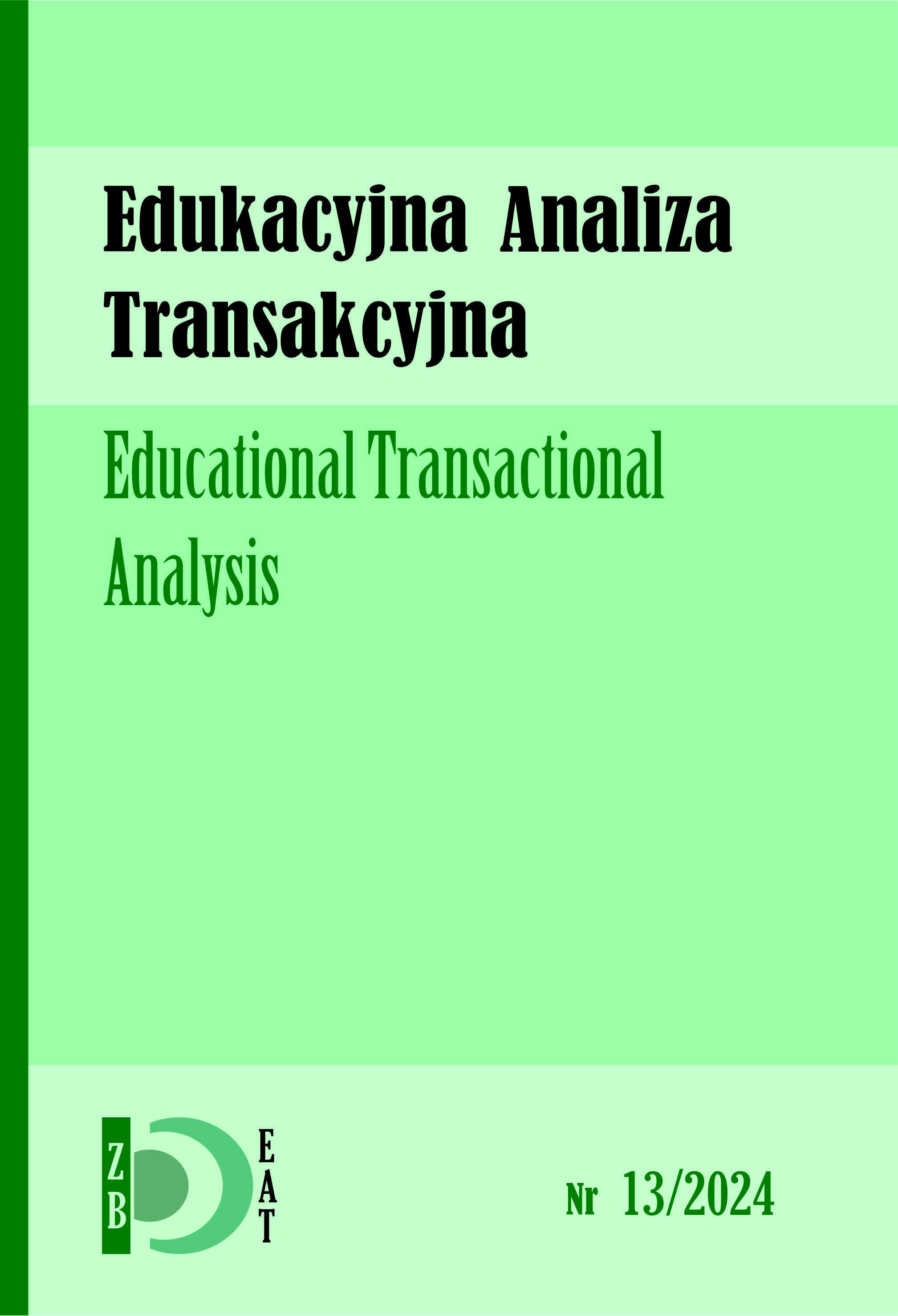Between Parents and Teachers? – A Pilot Study on the Relationship between Parents of Children with Disabilities and Teachers
DOI:
https://doi.org/10.16926/eat.2024.13.14Keywords:
inclusion, family, qualitative research, education, disabilityAbstract
This article describes a pilot study on the inter-system change of educational institutions from the perspective of families with children with disabilities. The theoretical section includes a review of literature on parental involvement, institutional changes, and the support provided by psychological and pedagogical counseling centers. The research problem is identical to the primary problem of the main study: What are the experiences of families of children with disabilities regarding inter-system changes in educational institutions? The aim of the interviews with directors of counseling centers was to identify specific issues, which the author addresses by analyzing the research material based on the categories identified: limited choice, school resistance, support, priorities, emotions, and parental attitudes. In conclusion, the author expands on the significance of the identified specific issues in the context of advanced analyses of the main study.
Downloads
References
American School Counselor Association. (1993). Position statement: Students with disabilities. VA: Author.
American School Counselor Association. (2003). The ASCA national model: A framework for school counseling programs. VA: Author.
Baker, B. L., Blacher, J., & Olsson, M. B. (2005). Preschool individuals with and without developmental delay: Behaviour problems, parents’ optimism, and well-being. Journal of Intellectual Disability Research, 49(7), 575–590. https://doi.org/10.1111/j.1365-2788.2005.00691.x
Barłóg, K. (2019). Upełnomocnienie rodziców dziecka z niepełnosprawnością w oddziaływaniach edukacyjno-rehabilitacyjnych. Niepełnosprawność, 36, 176–191. https://doi.org/10.4467/25439561.np.19.053.12296
Bourdieu, P., & Wacquant, L. (2001). Zaproszenie do socjologii refleksyjnej. Oficyna Naukowa.
Bryk, A., & Raudenbush, S. (1988). Toward a more appropriate conceptualization of research on school effects: A three-level hierarchical linear model. American Journal of Education, 97, 65–108. https://doi.org/10.1086/443913
Byra, S., & Parchomiuk, M., (2018). Resilience a potraumatyczny wzrost u matek dzieci z niepełnosprawnością. Człowiek - Niepełnosprawność - Społeczeństwo, 42(4). https://doi.org/10.5604/01.3001.0013.0282
Creswell, J. W. (2013). Projektowanie badań naukowych. Metody jakościowe, ilościowe i mieszane. Wydawnictwo Uniwersytetu Jagiellońskiego.
Fook, J. (2012). The challenges of creating critically reflective groups. Social Work With Groups, 35(3), 218–234. https://doi.org/10.1080/01609513.2011.624375
Goldspink, C. (2007). Transforming education: Evidential support for a complex systems approach. Emergence: Complexity & Organization, 9(1–2), 77–92.
Guba, E. G., & Lincoln, Y. S. (2009). Kontrowersje wokół paradygmatów, sprzeczności i wyłaniające się zbieżności In N. K. Denzin & Y. S. Lincoln (Eds.), Metody badań jakościowych, vol. 1 (pp. 281–313). Wydawnictwo Naukowe PWN.
Halpern, R. (2013). Tying early childhood education more closely to schooling: Promise, perils, and practical problems. Teachers College Record, 115(1), 1–28. https://doi.org/10.1177/016146811311500107
Hogan, S. O., Schulkin, J., Power, M., & Loft, J. D. (2009). Referral sampling: Using physicians to recruit patients. Survey Practice, 2(9). https://doi.org/10.29115/SP-2009-0038
Korbelak, M., & Lizak, M. (2017). Edukacja dzieci z orzeczeniami i opiniami poradni psychologiczno-pedagogicznej w masowych szkołach. Problemy Współczesnej Pedagogiki, 3(1), 77–91.
Krause, A. (2010). Współczesne paradygmaty pedagogiki specjalnej. Oficyna Wydawnicza „Impuls”.
Mamman, S. (2007). Introduction to special needs education: An introductory text for students of education. ASM Publishers.
Minnes, P., Perry, A., & Weiss, J. A. (2015). Predictors of distress and well-being in parents of young children with developmental delays and disabilities: The importance of parent perceptions. Journal of Intellectual Disability Research, 59(6), 551–560. https://doi.org/10.1111/jir.12160
Morse, J. M., & Niehaus, L. (2009). Principles and procedures of mixed methods design. Left Coast Press.
Mutanga, O. (2023). Ubuntu philosophy and disabilities in Sub-Saharan Africa. Routledge. https://doi.org/10.4324/9781003343684
Okeke, B. A. (2001). Essentials of special education. Afro-Orbis Publishing Company.
Ozozi, E. D. (1993). Disability awareness programmes: Objectives and implementation in Nigeria. Journal of Special Education, 3(2), 30–37.
Popławska, J., & Sierpińska, B. (2001). Zacznijmy razem: dzieci specjalnej troski w szkole podstawowej: poradnik dla nauczycieli szkół integracyjnych. Wydawnictwo Szkolne i Pedagogiczne.
Saravanabhavan, R., & Johnson, A. (2001). Child by child: The Comer process for change in education. Journal of Negro Education, 70, 116. https://doi.org/10.5860/choice.37-2902
Sekułowicz, M. (2013). Wypalenie się sił rodziców dzieci z niepełnosprawnością. Wydawnictwo Naukowe Dolnośląskiej Szkoły Wyższej.
Skałbania, B. (2010). Dyskusje wokół tożsamości poradnictwa pedagogicznego. Edukacja Dorosłych, 1, 189–198.
Skałbania, B. (2014). Poradnia psychologiczno-pedagogiczna jako miejsce o wielu znaczeniach Studia Prawoznawcze, 3, 106–119. https://doi.org/10.34862/sp.2014.5
Sundas, S. A., Charles, H., Satyaraj, & Rekha, K. (2023). Parental attitude towards intellectual disability and its impact on family relationships among parents of children with intellectual disability. Nursing Journal of India, CXIV(05), 214–219. https://doi.org/10.48029/nji.2023.cxiv504
Twardowski, A. (1991). Sytuacja rodzin dzieci niepełnosprawnych. In I. Obuchowska (Ed.), Dziecko niepełnosprawne w rodzinie (pp. 21–27). WSiP.
Twardowski, A. (2016). Rola upełnomocnienia rodziców w procesie wczesnego wspomagania rozwoju dzieci z niepełnosprawnościami. Niepełnosprawność. Dyskursy Pedagogiki Specjalnej, 24, 200–211. https://doi.org/10.4467/25439561.NP.16.013.6839
Wagner, T. (1998). Change as collaborative inquiry: A constructivist methodology for reinventing schools. Phi Delta Kappan, 79(7), 512–517.
Downloads
Published
How to Cite
Issue
Section
License
Copyright (c) 2024 Joanna Doroszuk

This work is licensed under a Creative Commons Attribution 4.0 International License.
I am aware that the Educational Transactional Analysis journal is published under a Creative Commons license - Attribution (https://creativecommons.org/licenses/by/4.0/legalcode).
By submitting the article, I agree to make it available under this license

